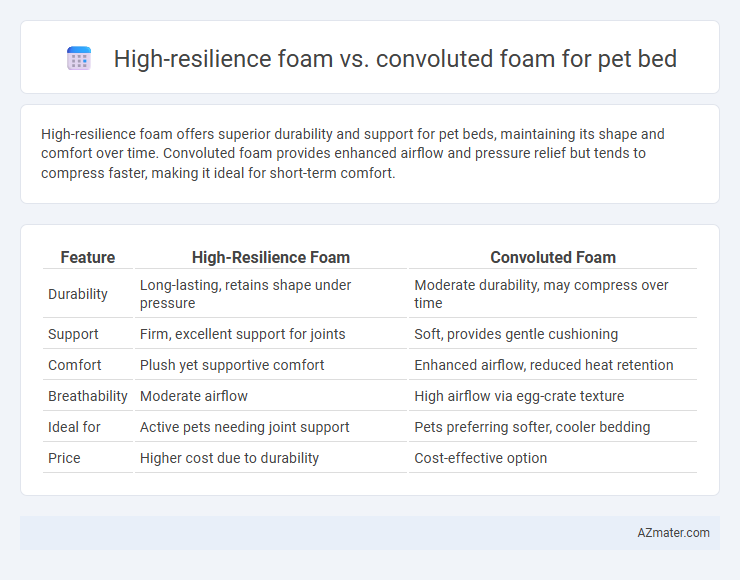High-resilience foam offers superior durability and support for pet beds, maintaining its shape and comfort over time. Convoluted foam provides enhanced airflow and pressure relief but tends to compress faster, making it ideal for short-term comfort.
Table of Comparison
| Feature | High-Resilience Foam | Convoluted Foam |
|---|---|---|
| Durability | Long-lasting, retains shape under pressure | Moderate durability, may compress over time |
| Support | Firm, excellent support for joints | Soft, provides gentle cushioning |
| Comfort | Plush yet supportive comfort | Enhanced airflow, reduced heat retention |
| Breathability | Moderate airflow | High airflow via egg-crate texture |
| Ideal for | Active pets needing joint support | Pets preferring softer, cooler bedding |
| Price | Higher cost due to durability | Cost-effective option |
Introduction to Pet Bed Foams
High-resilience foam offers superior durability and support for pet beds, maintaining shape and comfort even with prolonged use. Convoluted foam features an egg-crate design that enhances airflow and provides targeted pressure relief, ideal for pets needing extra cushioning. Selecting between these foams depends on pet size, sleeping habits, and specific orthopedic needs for optimal rest.
What is High-Resilience Foam?
High-resilience foam, a durable and firm material, offers excellent support and long-lasting comfort for pet beds due to its high density and elasticity. Unlike convoluted foam, which features a distinctive egg-crate pattern designed for breathability and pressure relief, high-resilience foam maintains structural integrity over time, making it ideal for pets with joint issues or requiring extra orthopedic support. Its superior rebound and resistance to deformation ensure consistent cushioning and enhanced durability in pet mattresses.
Understanding Convoluted Foam
Convoluted foam, characterized by its egg-crate texture, offers enhanced airflow and pressure relief, making it a popular choice for pet beds needing breathability and comfort. This foam differs from high-resilience foam by providing targeted support through its peaks and valleys that evenly distribute the pet's weight, reducing joint stress. Its open-cell design helps regulate temperature, preventing overheating and promoting restful sleep for pets with sensitive skin or arthritis.
Comfort and Support Comparison
High-resilience foam offers superior support and durability, maintaining its shape and providing consistent pressure relief for pets with joint issues or arthritis. Convoluted foam, characterized by its egg-crate design, enhances airflow and ventilation but may compress faster under weight, delivering moderate support and comfort. Choosing between the two depends on whether long-term orthopedic support or breathability and cushioning is a pet owner's priority.
Durability and Longevity
High-resilience foam offers superior durability and longevity for pet beds due to its dense structure and ability to retain shape under pressure, making it ideal for active pets or those who spend long hours resting. Convoluted foam, while providing enhanced airflow and comfort through its egg-crate design, tends to compress more quickly and may require replacement sooner. Choosing high-resilience foam ensures prolonged support and shape retention, contributing to a longer-lasting pet bed.
Breathability and Temperature Regulation
High-resilience foam offers superior breathability through its open-cell structure, allowing enhanced airflow that helps maintain consistent temperature regulation in pet beds. Convoluted foam, designed with peaks and valleys, promotes air circulation by increasing surface area, which also aids in dissipating heat and moisture effectively. Both foams contribute to a cooler and more comfortable sleeping environment, but high-resilience foam typically provides longer-lasting support while managing temperature better over time.
Maintenance and Cleaning Ease
High-resilience foam in pet beds offers superior durability and resists sagging, making it less prone to accumulating dirt and allergens, which simplifies routine cleaning. Convoluted foam, with its egg-crate texture, provides extra airflow but can trap pet hair and debris in its crevices, requiring more frequent and detailed maintenance. Choosing high-resilience foam enhances long-term hygiene and reduces the effort needed for effective pet bed cleaning.
Hypoallergenic Properties
High-resilience foam offers dense, supportive cushioning that resists dust mites and allergens, making it ideal for hypoallergenic pet beds. Convoluted foam, while providing superior airflow and pressure relief, tends to trap less moisture but may harbor allergens if not regularly cleaned. Selecting high-resilience foam with antimicrobial treatments maximizes hypoallergenic benefits for sensitive pets.
Cost Differences
High-resilience foam for pet beds typically costs more due to its superior durability and resilience, offering long-lasting comfort and support. Convoluted foam, often less expensive, features a distinctive egg-crate design that provides basic cushioning but may compress faster over time. Investing in high-resilience foam ensures better value despite the higher initial price, as it maintains shape and comfort longer than convoluted foam.
Which Foam Is Best for Your Pet?
High-resilience foam offers superior support and durability, making it ideal for pets with joint issues or larger breeds requiring firm cushioning. Convoluted foam provides enhanced airflow and pressure relief, benefiting pets prone to overheating or those needing softer, contouring comfort. Selecting the best foam depends on your pet's size, health needs, and sleeping habits for optimal rest and longevity.

Infographic: High-resilience foam vs Convoluted foam for Pet bed
 azmater.com
azmater.com